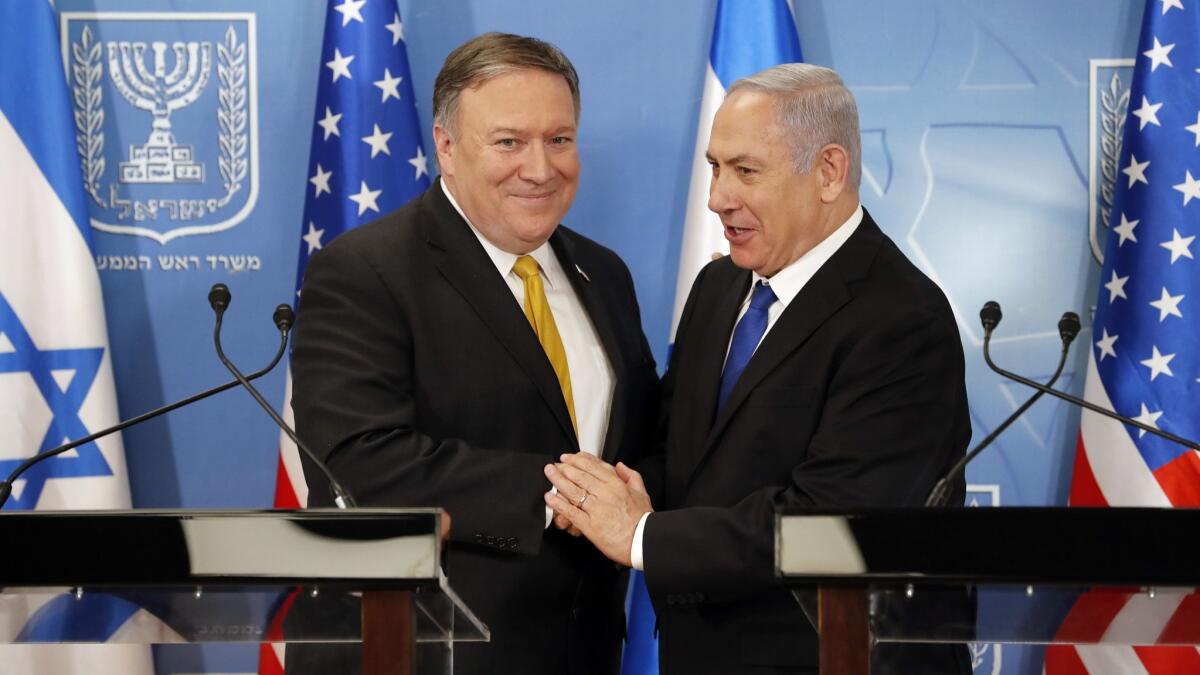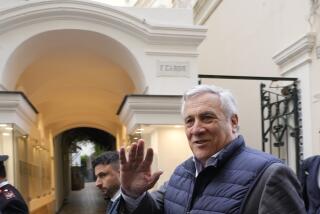Pompeo uses Mideast tour to accuse Iran of ‘destabilizing and malign activity’ in the region

Reporting from Jerusalem — Secretary of State Mike Pompeo, on his first trip to the Middle East as America’s top diplomat, sought to muster international support Sunday for a more robust response to what U.S. officials see as growing threats emanating from Iran.
On stops in Saudi Arabia and Israel, Pompeo said the deal to curtail Iran’s nuclear program does not do enough to counter the country’s “destabilizing and malign activity” in the region and repeated President Trump’s threats to pull out of the pact unless it is strengthened.
“It is indeed the greatest sponsor of terrorism in the world, and we are determined to make sure it never possesses a nuclear weapon,” Pompeo told reporters in brief remarks with his counterpart in the Saudi Arabian capital, Riyadh. “The Iran deal in its current form does not provide that assurance.”
Pompeo’s tough stance was warmly received by his hosts, key U.S. allies who have grown increasingly alarmed about Iran’s ambitions in the region and were opposed to the nuclear deal from the start.
Israeli officials worry that Iranian troops and allied militias, which have provided critical backing to Syria’s government during seven years of civil war, are establishing a permanent presence in that country that could be used to attack Israel. Uncertainty about how long Trump intends to keep American troops in Syria has only added to their concerns.
“If people thought that Iran’s aggression would be moderated as a result of signing the deal, the opposite has happened,” Israeli Prime Minister Benjamin Netanyahu said after a nearly two-hour meeting with Pompeo in Tel Aviv. “Iran is trying to gobble up one country after the other. Iran must be stopped.”
The Saudis accuse Iran of arming Houthi rebels in neighboring Yemen who have repeatedly targeted Saudi cities with ballistic missiles since the kingdom formed a military coalition in 2015 to restore Yemen’s internationally recognized government to power — a charge denied by Tehran.
Saudi Foreign Minister Adel Jubeir said the kingdom “supports the policy of the Trump administration against Iran and to improve the terms of the nuclear agreement with Iran.”
Trump has said he will decide by May 12 whether to pull out of the agreement to curtail Iran’s ability to build nuclear weapons, which was signed by the United States and five other world powers in 2015.
The leaders of France and Germany both flew to Washington last week to try to persuade Trump to not unilaterally reimpose nuclear-related sanctions, a move that Iranian officials have said would kill the deal.
European diplomats have been meeting with their U.S. counterparts to try to negotiate supplementary agreements to address Trump’s concerns, including the absence of mechanisms to address Iran’s missile programs and its support for militant groups in the Middle East. But Pompeo warned Sunday, “If we can’t fix it, he’s going to withdraw from the deal.”
Pompeo’s hastily arranged visits to Saudi Arabia and Israel, just days after he was sworn in, reflect the close ties forged by the Trump administration in its attempts to counter Iran. Trump also visited both countries on his first official trip as president.
Pompeo flew to Riyadh on Saturday from a North Atlantic Treaty Organization summit in Brussels. After meetings with King Salman, Crown Prince Mohammed bin Salman and Jubeir, he continued on to Israel and Jordan, where he will meet with King Abdullah II on Monday.
Pompeo said he assured leaders in both Israel and Saudi Arabia that the U.S. will stand by its allies and supports their right to defend themselves. But he also emphasized the need to find political solutions to the region’s conflicts.
U.S. officials are concerned about the alarming toll of the war in Yemen, which the United Nations says has killed at least 10,000 people, displaced 3 million and contributed to a devastating cholera outbreak in what was already the Arab world’s poorest nation.
“The long-standing political and security vacuum created by the conflict, as well as deteriorating humanitarian conditions, have also been exploited in Yemen by Al Qaeda in the Arabian Peninsula and by ISIS,” Pompeo said, using an acronym for the extremist group Islamic State. “When these groups are given safe haven, the U.S. homeland is at risk.”
Pompeo also urged the Saudis to resolve their dispute with neighboring Qatar, which U.S. officials say is preventing a unified response among Arab nations against Iran. In June, Saudi Arabia, along with the United Arab Emirates, Bahrain and Egypt, imposed an embargo on Qatar over its close ties to Iran and alleged support for terrorists. Qatar denies the charges.
“I think they would all agree that it’s in everyone’s best interests that the [Persian] Gulf states all figure out how to be together,” Pompeo told reporters on route to Israel. “We’ve got a common challenge in Iran. I think they all recognize that.”
While Iran was the main focus of Pompeo’s trip, it also was an opportunity for the new secretary of State to establish his role as the administration’s lead interlocutor with the Israeli government — which was not the case with his predecessor, Rex Tillerson.
“The previous secretary had no part in those relationships and was essentially sidelined by various White House senior aides,” said Daniel B. Shapiro, a former U.S. ambassador to Israel under President Obama.
But Pompeo did not meet with any Palestinian officials Sunday, a decision that Majdi Khaldi, a diplomatic advisor to Palestinian Authority President Mahmoud Abbas, said was “our choice.”
The Palestinian Authority severed most political contact with the White House over Trump’s decision to recognize Jerusalem as Israel’s capital. Palestinians also claim part of the city for a future independent state.
Pompeo said the Trump administration was “incredibly proud” to be opening an embassy in Jerusalem on May 14, but said the boundaries of Israeli sovereignty in the city remain subject to negotiation.
Special correspondent Tarnopolsky reported from Jerusalem and Times staff writer Zavis from Beirut.
Twitter: @alexzavis
More to Read
Sign up for Essential California
The most important California stories and recommendations in your inbox every morning.
You may occasionally receive promotional content from the Los Angeles Times.











